University Assignment: Social Entrepreneurship and Impact Report
VerifiedAdded on 2022/11/24
|6
|1414
|373
Report
AI Summary
This report delves into the realm of social entrepreneurship, examining the core definitions and the role of social entrepreneurs as ethical change agents. It explores the challenges they encounter while pursuing both social and business objectives, such as low-profit margins, mission drift, and difficulties in securing funding. The report provides insights into potential solutions to overcome these challenges, including strong mission statements, provision of products or services of lesser value, and the creation of scalable business models. It also discusses the importance of social entrepreneurs and their impact in society. The report concludes by highlighting the significance of social entrepreneurship in driving positive change, referencing key aspects of the social entrepreneurship concept and its relevance in the contemporary world, providing a valuable resource for students and professionals interested in this field.

Running head: MANAGAMENT FOR SOCIAL IMPACT 1
MANAGEMENT FOR SOCIAL IMPACT
Name of Student
Institution Affiliation
MANAGEMENT FOR SOCIAL IMPACT
Name of Student
Institution Affiliation
Paraphrase This Document
Need a fresh take? Get an instant paraphrase of this document with our AI Paraphraser
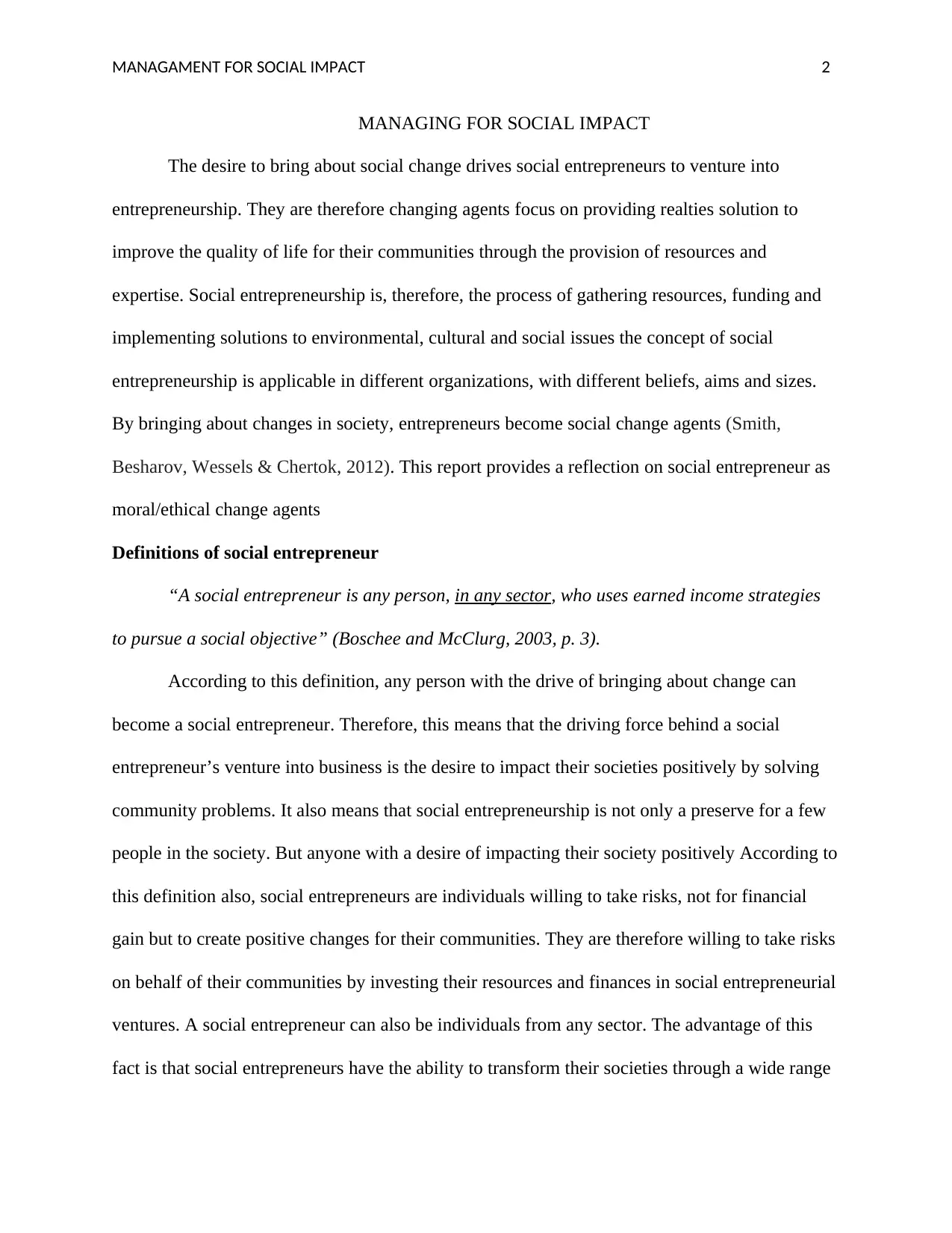
MANAGAMENT FOR SOCIAL IMPACT 2
MANAGING FOR SOCIAL IMPACT
The desire to bring about social change drives social entrepreneurs to venture into
entrepreneurship. They are therefore changing agents focus on providing realties solution to
improve the quality of life for their communities through the provision of resources and
expertise. Social entrepreneurship is, therefore, the process of gathering resources, funding and
implementing solutions to environmental, cultural and social issues the concept of social
entrepreneurship is applicable in different organizations, with different beliefs, aims and sizes.
By bringing about changes in society, entrepreneurs become social change agents (Smith,
Besharov, Wessels & Chertok, 2012). This report provides a reflection on social entrepreneur as
moral/ethical change agents
Definitions of social entrepreneur
“A social entrepreneur is any person, in any sector, who uses earned income strategies
to pursue a social objective” (Boschee and McClurg, 2003, p. 3).
According to this definition, any person with the drive of bringing about change can
become a social entrepreneur. Therefore, this means that the driving force behind a social
entrepreneur’s venture into business is the desire to impact their societies positively by solving
community problems. It also means that social entrepreneurship is not only a preserve for a few
people in the society. But anyone with a desire of impacting their society positively According to
this definition also, social entrepreneurs are individuals willing to take risks, not for financial
gain but to create positive changes for their communities. They are therefore willing to take risks
on behalf of their communities by investing their resources and finances in social entrepreneurial
ventures. A social entrepreneur can also be individuals from any sector. The advantage of this
fact is that social entrepreneurs have the ability to transform their societies through a wide range
MANAGING FOR SOCIAL IMPACT
The desire to bring about social change drives social entrepreneurs to venture into
entrepreneurship. They are therefore changing agents focus on providing realties solution to
improve the quality of life for their communities through the provision of resources and
expertise. Social entrepreneurship is, therefore, the process of gathering resources, funding and
implementing solutions to environmental, cultural and social issues the concept of social
entrepreneurship is applicable in different organizations, with different beliefs, aims and sizes.
By bringing about changes in society, entrepreneurs become social change agents (Smith,
Besharov, Wessels & Chertok, 2012). This report provides a reflection on social entrepreneur as
moral/ethical change agents
Definitions of social entrepreneur
“A social entrepreneur is any person, in any sector, who uses earned income strategies
to pursue a social objective” (Boschee and McClurg, 2003, p. 3).
According to this definition, any person with the drive of bringing about change can
become a social entrepreneur. Therefore, this means that the driving force behind a social
entrepreneur’s venture into business is the desire to impact their societies positively by solving
community problems. It also means that social entrepreneurship is not only a preserve for a few
people in the society. But anyone with a desire of impacting their society positively According to
this definition also, social entrepreneurs are individuals willing to take risks, not for financial
gain but to create positive changes for their communities. They are therefore willing to take risks
on behalf of their communities by investing their resources and finances in social entrepreneurial
ventures. A social entrepreneur can also be individuals from any sector. The advantage of this
fact is that social entrepreneurs have the ability to transform their societies through a wide range
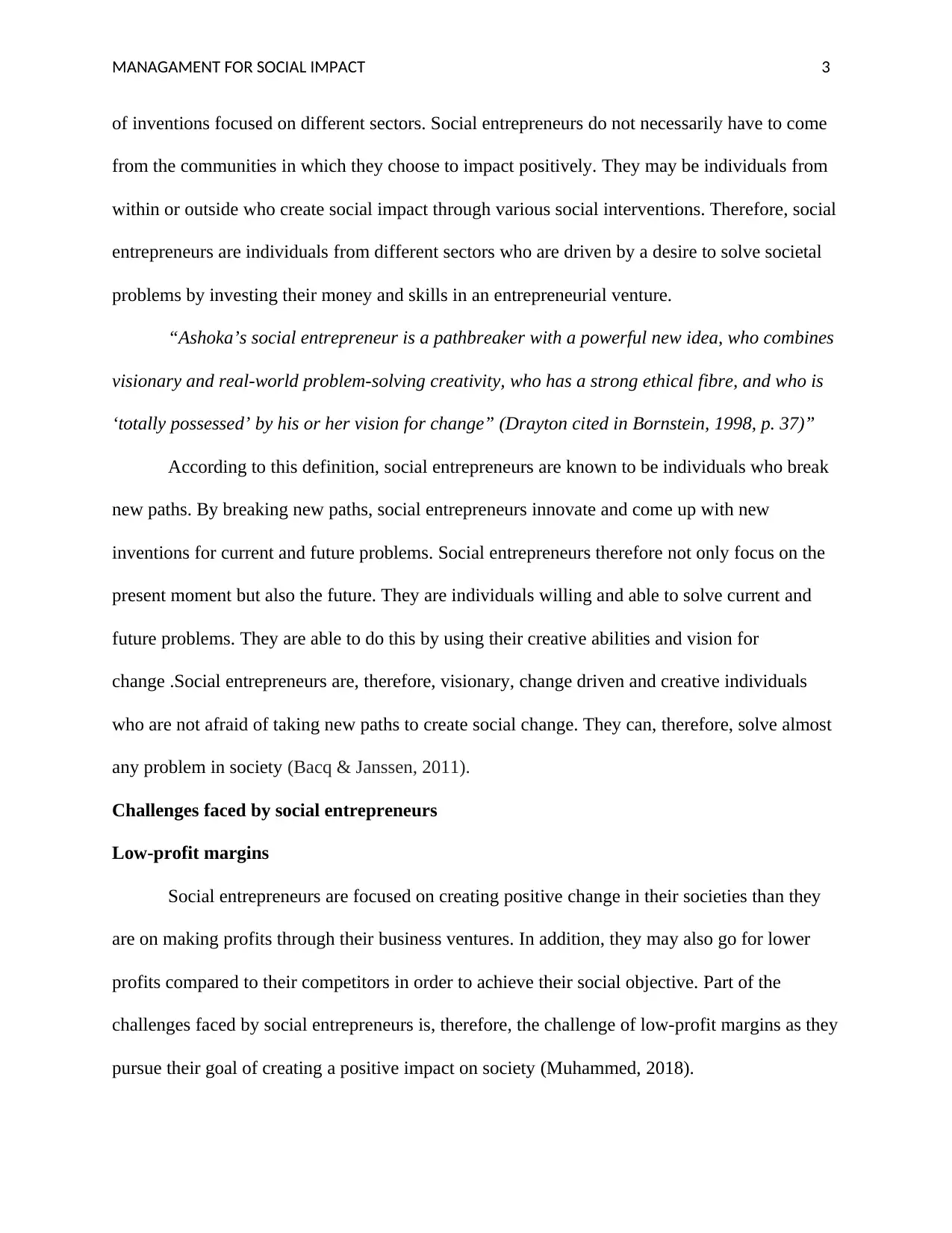
MANAGAMENT FOR SOCIAL IMPACT 3
of inventions focused on different sectors. Social entrepreneurs do not necessarily have to come
from the communities in which they choose to impact positively. They may be individuals from
within or outside who create social impact through various social interventions. Therefore, social
entrepreneurs are individuals from different sectors who are driven by a desire to solve societal
problems by investing their money and skills in an entrepreneurial venture.
“Ashoka’s social entrepreneur is a pathbreaker with a powerful new idea, who combines
visionary and real-world problem-solving creativity, who has a strong ethical fibre, and who is
‘totally possessed’ by his or her vision for change” (Drayton cited in Bornstein, 1998, p. 37)”
According to this definition, social entrepreneurs are known to be individuals who break
new paths. By breaking new paths, social entrepreneurs innovate and come up with new
inventions for current and future problems. Social entrepreneurs therefore not only focus on the
present moment but also the future. They are individuals willing and able to solve current and
future problems. They are able to do this by using their creative abilities and vision for
change .Social entrepreneurs are, therefore, visionary, change driven and creative individuals
who are not afraid of taking new paths to create social change. They can, therefore, solve almost
any problem in society (Bacq & Janssen, 2011).
Challenges faced by social entrepreneurs
Low-profit margins
Social entrepreneurs are focused on creating positive change in their societies than they
are on making profits through their business ventures. In addition, they may also go for lower
profits compared to their competitors in order to achieve their social objective. Part of the
challenges faced by social entrepreneurs is, therefore, the challenge of low-profit margins as they
pursue their goal of creating a positive impact on society (Muhammed, 2018).
of inventions focused on different sectors. Social entrepreneurs do not necessarily have to come
from the communities in which they choose to impact positively. They may be individuals from
within or outside who create social impact through various social interventions. Therefore, social
entrepreneurs are individuals from different sectors who are driven by a desire to solve societal
problems by investing their money and skills in an entrepreneurial venture.
“Ashoka’s social entrepreneur is a pathbreaker with a powerful new idea, who combines
visionary and real-world problem-solving creativity, who has a strong ethical fibre, and who is
‘totally possessed’ by his or her vision for change” (Drayton cited in Bornstein, 1998, p. 37)”
According to this definition, social entrepreneurs are known to be individuals who break
new paths. By breaking new paths, social entrepreneurs innovate and come up with new
inventions for current and future problems. Social entrepreneurs therefore not only focus on the
present moment but also the future. They are individuals willing and able to solve current and
future problems. They are able to do this by using their creative abilities and vision for
change .Social entrepreneurs are, therefore, visionary, change driven and creative individuals
who are not afraid of taking new paths to create social change. They can, therefore, solve almost
any problem in society (Bacq & Janssen, 2011).
Challenges faced by social entrepreneurs
Low-profit margins
Social entrepreneurs are focused on creating positive change in their societies than they
are on making profits through their business ventures. In addition, they may also go for lower
profits compared to their competitors in order to achieve their social objective. Part of the
challenges faced by social entrepreneurs is, therefore, the challenge of low-profit margins as they
pursue their goal of creating a positive impact on society (Muhammed, 2018).
⊘ This is a preview!⊘
Do you want full access?
Subscribe today to unlock all pages.

Trusted by 1+ million students worldwide
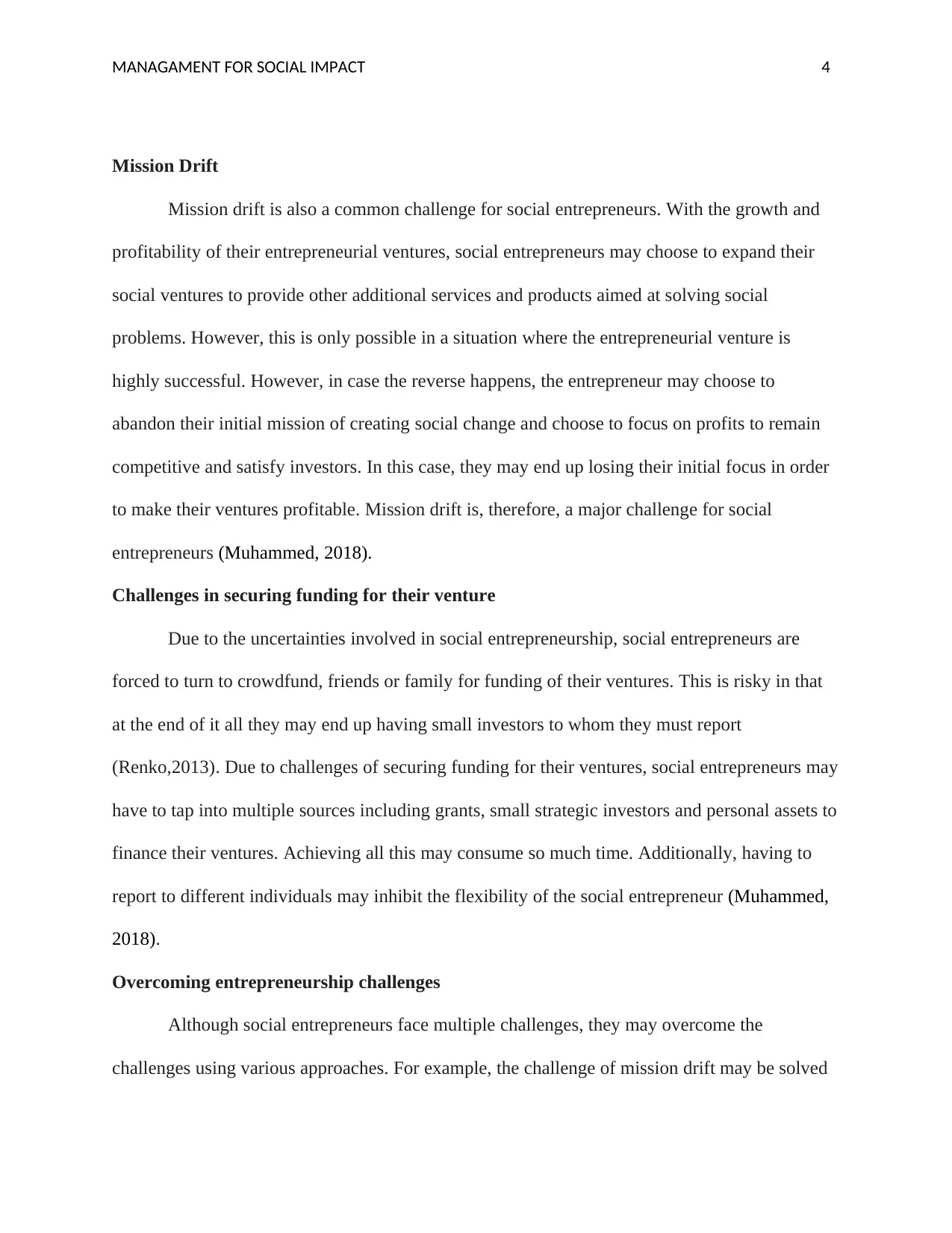
MANAGAMENT FOR SOCIAL IMPACT 4
Mission Drift
Mission drift is also a common challenge for social entrepreneurs. With the growth and
profitability of their entrepreneurial ventures, social entrepreneurs may choose to expand their
social ventures to provide other additional services and products aimed at solving social
problems. However, this is only possible in a situation where the entrepreneurial venture is
highly successful. However, in case the reverse happens, the entrepreneur may choose to
abandon their initial mission of creating social change and choose to focus on profits to remain
competitive and satisfy investors. In this case, they may end up losing their initial focus in order
to make their ventures profitable. Mission drift is, therefore, a major challenge for social
entrepreneurs (Muhammed, 2018).
Challenges in securing funding for their venture
Due to the uncertainties involved in social entrepreneurship, social entrepreneurs are
forced to turn to crowdfund, friends or family for funding of their ventures. This is risky in that
at the end of it all they may end up having small investors to whom they must report
(Renko,2013). Due to challenges of securing funding for their ventures, social entrepreneurs may
have to tap into multiple sources including grants, small strategic investors and personal assets to
finance their ventures. Achieving all this may consume so much time. Additionally, having to
report to different individuals may inhibit the flexibility of the social entrepreneur (Muhammed,
2018).
Overcoming entrepreneurship challenges
Although social entrepreneurs face multiple challenges, they may overcome the
challenges using various approaches. For example, the challenge of mission drift may be solved
Mission Drift
Mission drift is also a common challenge for social entrepreneurs. With the growth and
profitability of their entrepreneurial ventures, social entrepreneurs may choose to expand their
social ventures to provide other additional services and products aimed at solving social
problems. However, this is only possible in a situation where the entrepreneurial venture is
highly successful. However, in case the reverse happens, the entrepreneur may choose to
abandon their initial mission of creating social change and choose to focus on profits to remain
competitive and satisfy investors. In this case, they may end up losing their initial focus in order
to make their ventures profitable. Mission drift is, therefore, a major challenge for social
entrepreneurs (Muhammed, 2018).
Challenges in securing funding for their venture
Due to the uncertainties involved in social entrepreneurship, social entrepreneurs are
forced to turn to crowdfund, friends or family for funding of their ventures. This is risky in that
at the end of it all they may end up having small investors to whom they must report
(Renko,2013). Due to challenges of securing funding for their ventures, social entrepreneurs may
have to tap into multiple sources including grants, small strategic investors and personal assets to
finance their ventures. Achieving all this may consume so much time. Additionally, having to
report to different individuals may inhibit the flexibility of the social entrepreneur (Muhammed,
2018).
Overcoming entrepreneurship challenges
Although social entrepreneurs face multiple challenges, they may overcome the
challenges using various approaches. For example, the challenge of mission drift may be solved
Paraphrase This Document
Need a fresh take? Get an instant paraphrase of this document with our AI Paraphraser
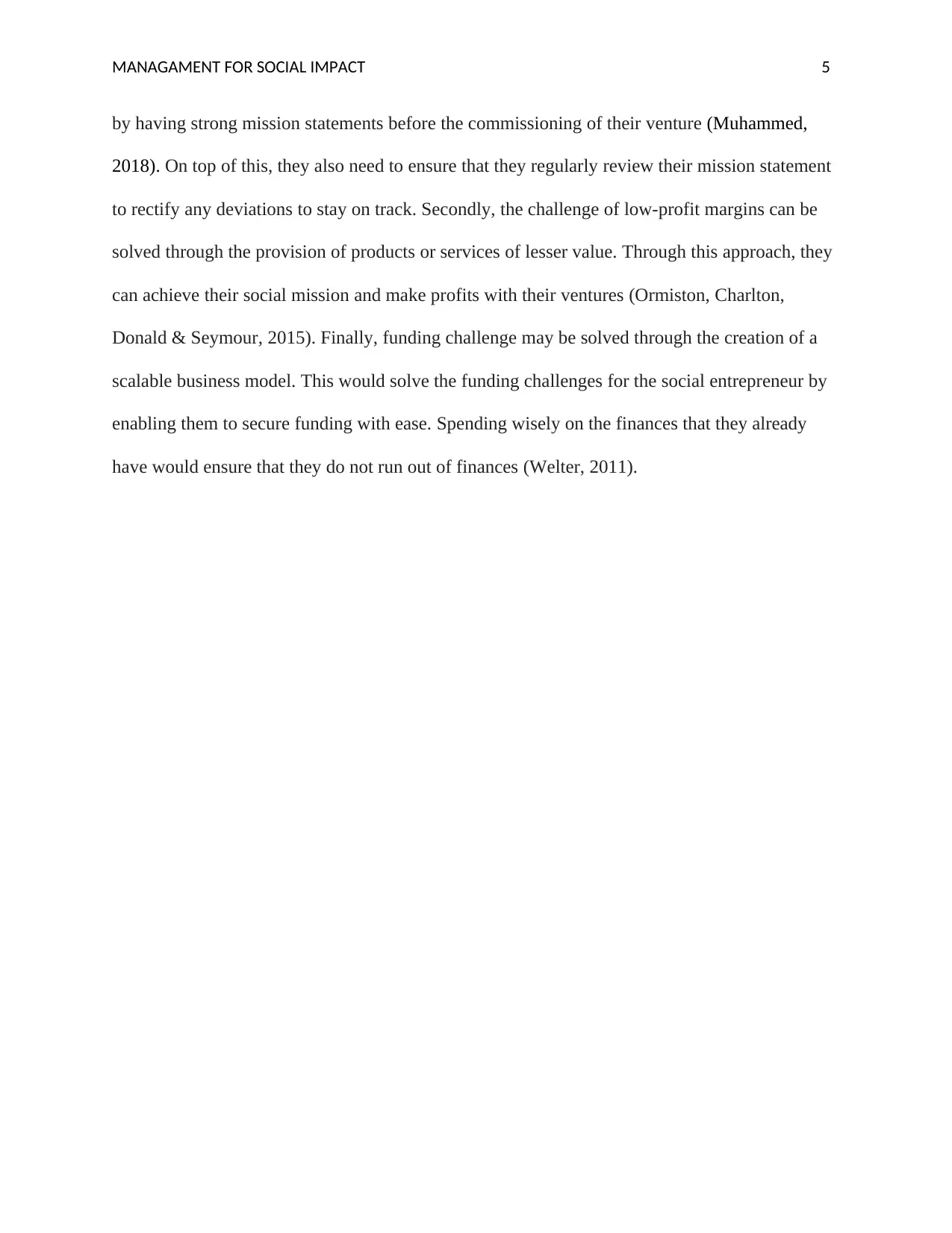
MANAGAMENT FOR SOCIAL IMPACT 5
by having strong mission statements before the commissioning of their venture (Muhammed,
2018). On top of this, they also need to ensure that they regularly review their mission statement
to rectify any deviations to stay on track. Secondly, the challenge of low-profit margins can be
solved through the provision of products or services of lesser value. Through this approach, they
can achieve their social mission and make profits with their ventures (Ormiston, Charlton,
Donald & Seymour, 2015). Finally, funding challenge may be solved through the creation of a
scalable business model. This would solve the funding challenges for the social entrepreneur by
enabling them to secure funding with ease. Spending wisely on the finances that they already
have would ensure that they do not run out of finances (Welter, 2011).
by having strong mission statements before the commissioning of their venture (Muhammed,
2018). On top of this, they also need to ensure that they regularly review their mission statement
to rectify any deviations to stay on track. Secondly, the challenge of low-profit margins can be
solved through the provision of products or services of lesser value. Through this approach, they
can achieve their social mission and make profits with their ventures (Ormiston, Charlton,
Donald & Seymour, 2015). Finally, funding challenge may be solved through the creation of a
scalable business model. This would solve the funding challenges for the social entrepreneur by
enabling them to secure funding with ease. Spending wisely on the finances that they already
have would ensure that they do not run out of finances (Welter, 2011).
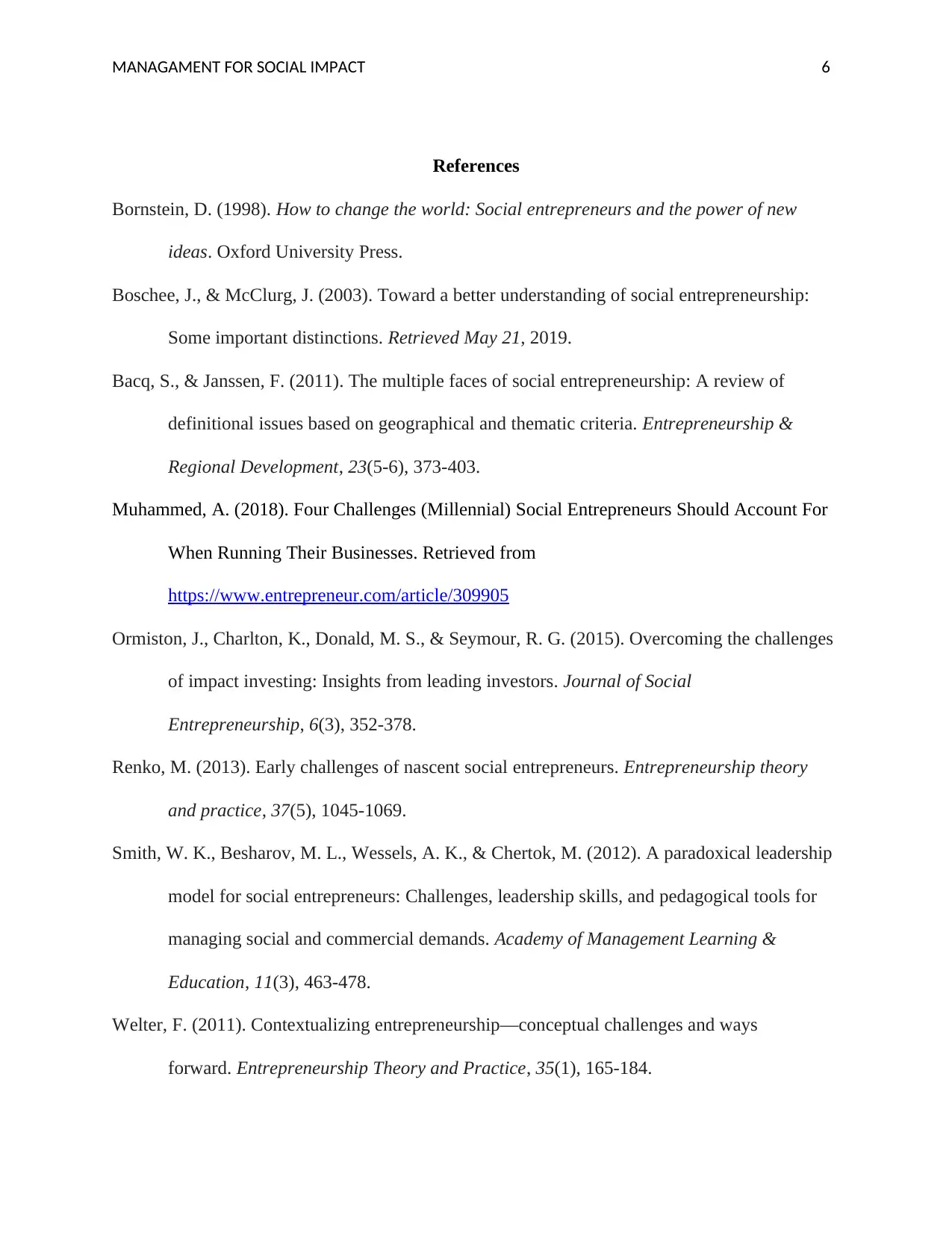
MANAGAMENT FOR SOCIAL IMPACT 6
References
Bornstein, D. (1998). How to change the world: Social entrepreneurs and the power of new
ideas. Oxford University Press.
Boschee, J., & McClurg, J. (2003). Toward a better understanding of social entrepreneurship:
Some important distinctions. Retrieved May 21, 2019.
Bacq, S., & Janssen, F. (2011). The multiple faces of social entrepreneurship: A review of
definitional issues based on geographical and thematic criteria. Entrepreneurship &
Regional Development, 23(5-6), 373-403.
Muhammed, A. (2018). Four Challenges (Millennial) Social Entrepreneurs Should Account For
When Running Their Businesses. Retrieved from
https://www.entrepreneur.com/article/309905
Ormiston, J., Charlton, K., Donald, M. S., & Seymour, R. G. (2015). Overcoming the challenges
of impact investing: Insights from leading investors. Journal of Social
Entrepreneurship, 6(3), 352-378.
Renko, M. (2013). Early challenges of nascent social entrepreneurs. Entrepreneurship theory
and practice, 37(5), 1045-1069.
Smith, W. K., Besharov, M. L., Wessels, A. K., & Chertok, M. (2012). A paradoxical leadership
model for social entrepreneurs: Challenges, leadership skills, and pedagogical tools for
managing social and commercial demands. Academy of Management Learning &
Education, 11(3), 463-478.
Welter, F. (2011). Contextualizing entrepreneurship—conceptual challenges and ways
forward. Entrepreneurship Theory and Practice, 35(1), 165-184.
References
Bornstein, D. (1998). How to change the world: Social entrepreneurs and the power of new
ideas. Oxford University Press.
Boschee, J., & McClurg, J. (2003). Toward a better understanding of social entrepreneurship:
Some important distinctions. Retrieved May 21, 2019.
Bacq, S., & Janssen, F. (2011). The multiple faces of social entrepreneurship: A review of
definitional issues based on geographical and thematic criteria. Entrepreneurship &
Regional Development, 23(5-6), 373-403.
Muhammed, A. (2018). Four Challenges (Millennial) Social Entrepreneurs Should Account For
When Running Their Businesses. Retrieved from
https://www.entrepreneur.com/article/309905
Ormiston, J., Charlton, K., Donald, M. S., & Seymour, R. G. (2015). Overcoming the challenges
of impact investing: Insights from leading investors. Journal of Social
Entrepreneurship, 6(3), 352-378.
Renko, M. (2013). Early challenges of nascent social entrepreneurs. Entrepreneurship theory
and practice, 37(5), 1045-1069.
Smith, W. K., Besharov, M. L., Wessels, A. K., & Chertok, M. (2012). A paradoxical leadership
model for social entrepreneurs: Challenges, leadership skills, and pedagogical tools for
managing social and commercial demands. Academy of Management Learning &
Education, 11(3), 463-478.
Welter, F. (2011). Contextualizing entrepreneurship—conceptual challenges and ways
forward. Entrepreneurship Theory and Practice, 35(1), 165-184.
⊘ This is a preview!⊘
Do you want full access?
Subscribe today to unlock all pages.

Trusted by 1+ million students worldwide
1 out of 6
Related Documents
Your All-in-One AI-Powered Toolkit for Academic Success.
+13062052269
info@desklib.com
Available 24*7 on WhatsApp / Email
![[object Object]](/_next/static/media/star-bottom.7253800d.svg)
Unlock your academic potential
Copyright © 2020–2026 A2Z Services. All Rights Reserved. Developed and managed by ZUCOL.




